Organic Food Demand and Whole Foods Market
VerifiedAdded on 2020/03/04
|11
|3864
|262
AI Summary
This assignment analyzes the market position of Whole Foods Market, a prominent retailer specializing in organic and natural foods. It examines consumer attitudes and demand for organic products, drawing on research from sources like Zepeda (2005) and Padel & Foster (2005). The analysis also considers Whole Foods Market's competitive environment using Porter's Five Forces framework, as described by Lombardo (2017), and the company's potential strategic advantages related to corporate social responsibility (Falkenberg & Brunsæl, 2011).
Contribute Materials
Your contribution can guide someone’s learning journey. Share your
documents today.
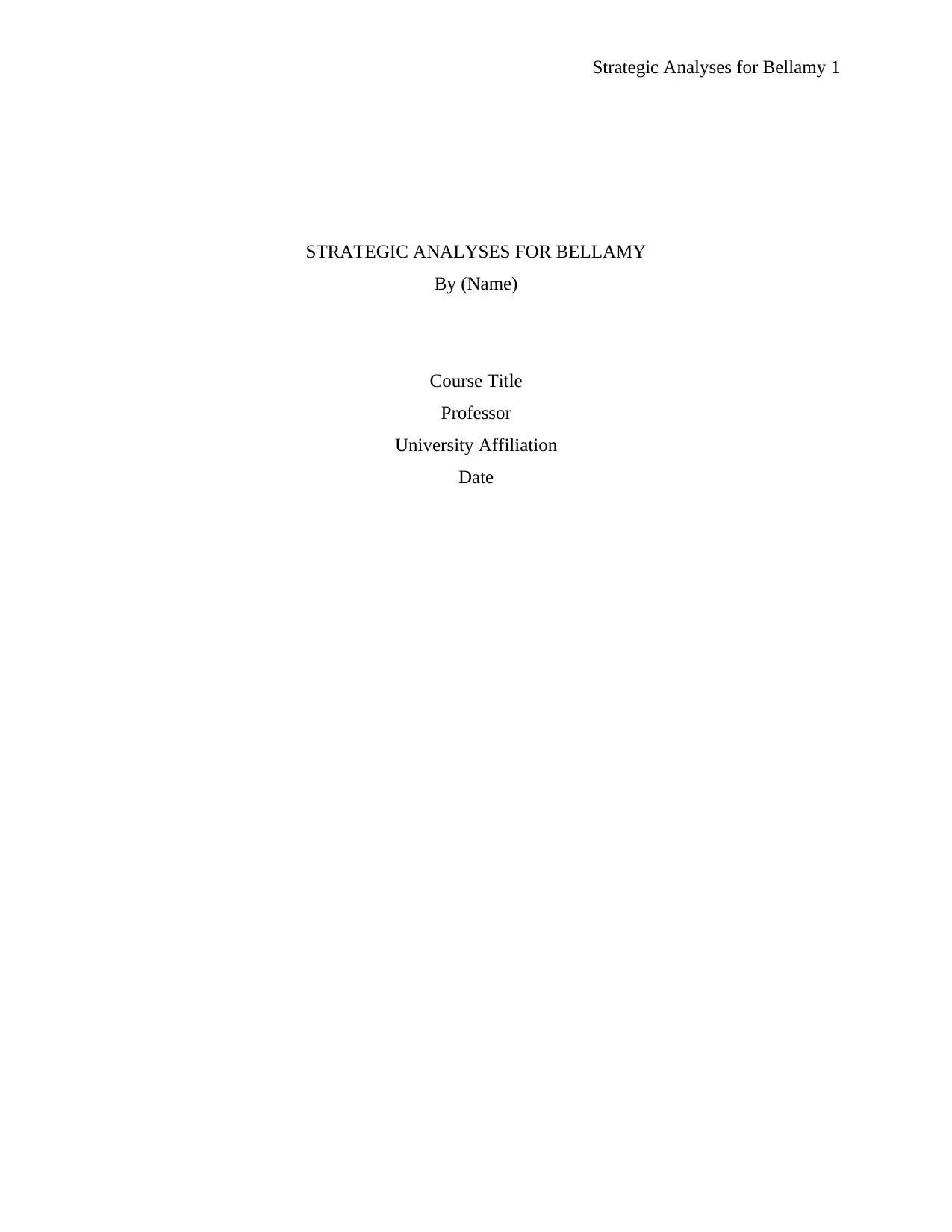
Strategic Analyses for Bellamy 1
STRATEGIC ANALYSES FOR BELLAMY
By (Name)
Course Title
Professor
University Affiliation
Date
STRATEGIC ANALYSES FOR BELLAMY
By (Name)
Course Title
Professor
University Affiliation
Date
Secure Best Marks with AI Grader
Need help grading? Try our AI Grader for instant feedback on your assignments.
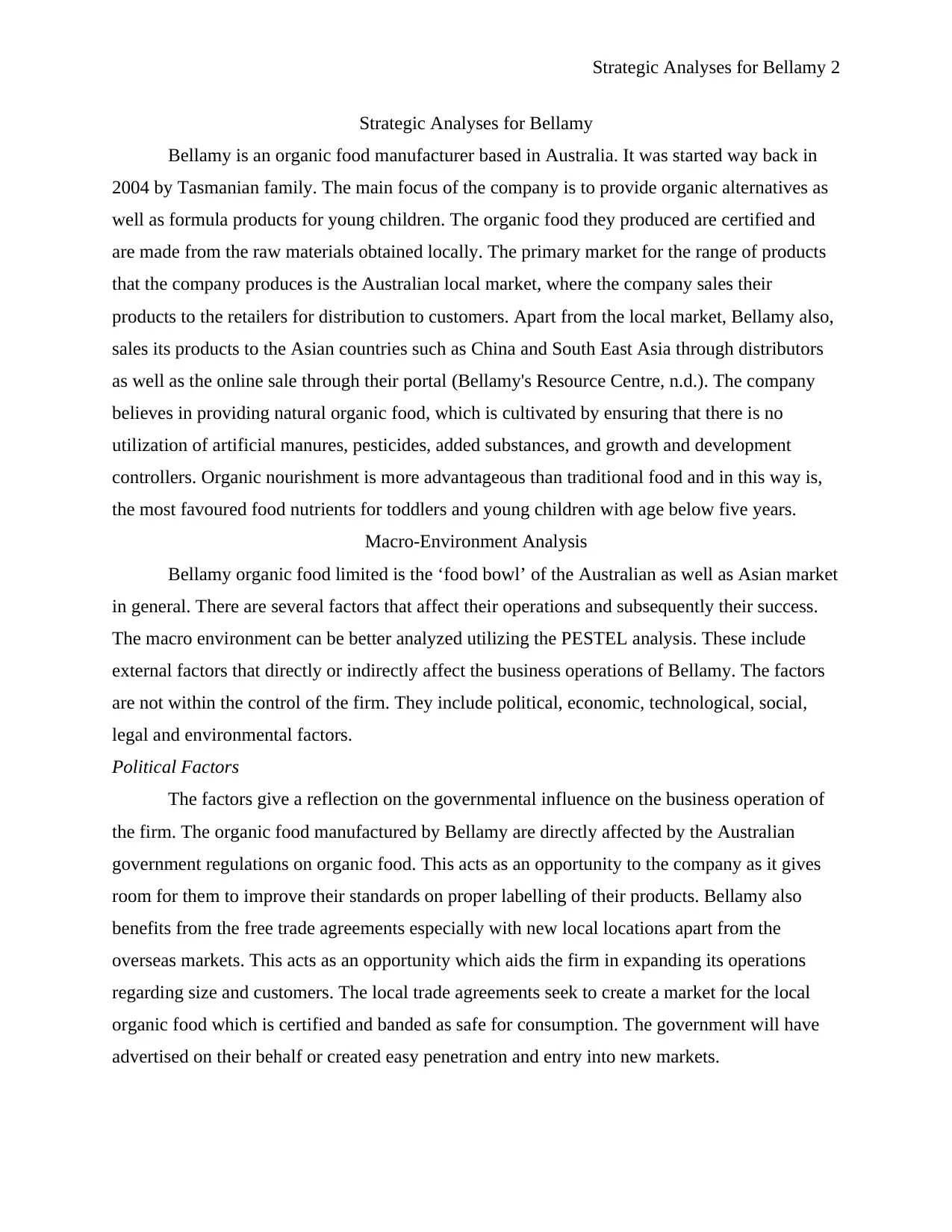
Strategic Analyses for Bellamy 2
Strategic Analyses for Bellamy
Bellamy is an organic food manufacturer based in Australia. It was started way back in
2004 by Tasmanian family. The main focus of the company is to provide organic alternatives as
well as formula products for young children. The organic food they produced are certified and
are made from the raw materials obtained locally. The primary market for the range of products
that the company produces is the Australian local market, where the company sales their
products to the retailers for distribution to customers. Apart from the local market, Bellamy also,
sales its products to the Asian countries such as China and South East Asia through distributors
as well as the online sale through their portal (Bellamy's Resource Centre, n.d.). The company
believes in providing natural organic food, which is cultivated by ensuring that there is no
utilization of artificial manures, pesticides, added substances, and growth and development
controllers. Organic nourishment is more advantageous than traditional food and in this way is,
the most favoured food nutrients for toddlers and young children with age below five years.
Macro-Environment Analysis
Bellamy organic food limited is the ‘food bowl’ of the Australian as well as Asian market
in general. There are several factors that affect their operations and subsequently their success.
The macro environment can be better analyzed utilizing the PESTEL analysis. These include
external factors that directly or indirectly affect the business operations of Bellamy. The factors
are not within the control of the firm. They include political, economic, technological, social,
legal and environmental factors.
Political Factors
The factors give a reflection on the governmental influence on the business operation of
the firm. The organic food manufactured by Bellamy are directly affected by the Australian
government regulations on organic food. This acts as an opportunity to the company as it gives
room for them to improve their standards on proper labelling of their products. Bellamy also
benefits from the free trade agreements especially with new local locations apart from the
overseas markets. This acts as an opportunity which aids the firm in expanding its operations
regarding size and customers. The local trade agreements seek to create a market for the local
organic food which is certified and banded as safe for consumption. The government will have
advertised on their behalf or created easy penetration and entry into new markets.
Strategic Analyses for Bellamy
Bellamy is an organic food manufacturer based in Australia. It was started way back in
2004 by Tasmanian family. The main focus of the company is to provide organic alternatives as
well as formula products for young children. The organic food they produced are certified and
are made from the raw materials obtained locally. The primary market for the range of products
that the company produces is the Australian local market, where the company sales their
products to the retailers for distribution to customers. Apart from the local market, Bellamy also,
sales its products to the Asian countries such as China and South East Asia through distributors
as well as the online sale through their portal (Bellamy's Resource Centre, n.d.). The company
believes in providing natural organic food, which is cultivated by ensuring that there is no
utilization of artificial manures, pesticides, added substances, and growth and development
controllers. Organic nourishment is more advantageous than traditional food and in this way is,
the most favoured food nutrients for toddlers and young children with age below five years.
Macro-Environment Analysis
Bellamy organic food limited is the ‘food bowl’ of the Australian as well as Asian market
in general. There are several factors that affect their operations and subsequently their success.
The macro environment can be better analyzed utilizing the PESTEL analysis. These include
external factors that directly or indirectly affect the business operations of Bellamy. The factors
are not within the control of the firm. They include political, economic, technological, social,
legal and environmental factors.
Political Factors
The factors give a reflection on the governmental influence on the business operation of
the firm. The organic food manufactured by Bellamy are directly affected by the Australian
government regulations on organic food. This acts as an opportunity to the company as it gives
room for them to improve their standards on proper labelling of their products. Bellamy also
benefits from the free trade agreements especially with new local locations apart from the
overseas markets. This acts as an opportunity which aids the firm in expanding its operations
regarding size and customers. The local trade agreements seek to create a market for the local
organic food which is certified and banded as safe for consumption. The government will have
advertised on their behalf or created easy penetration and entry into new markets.
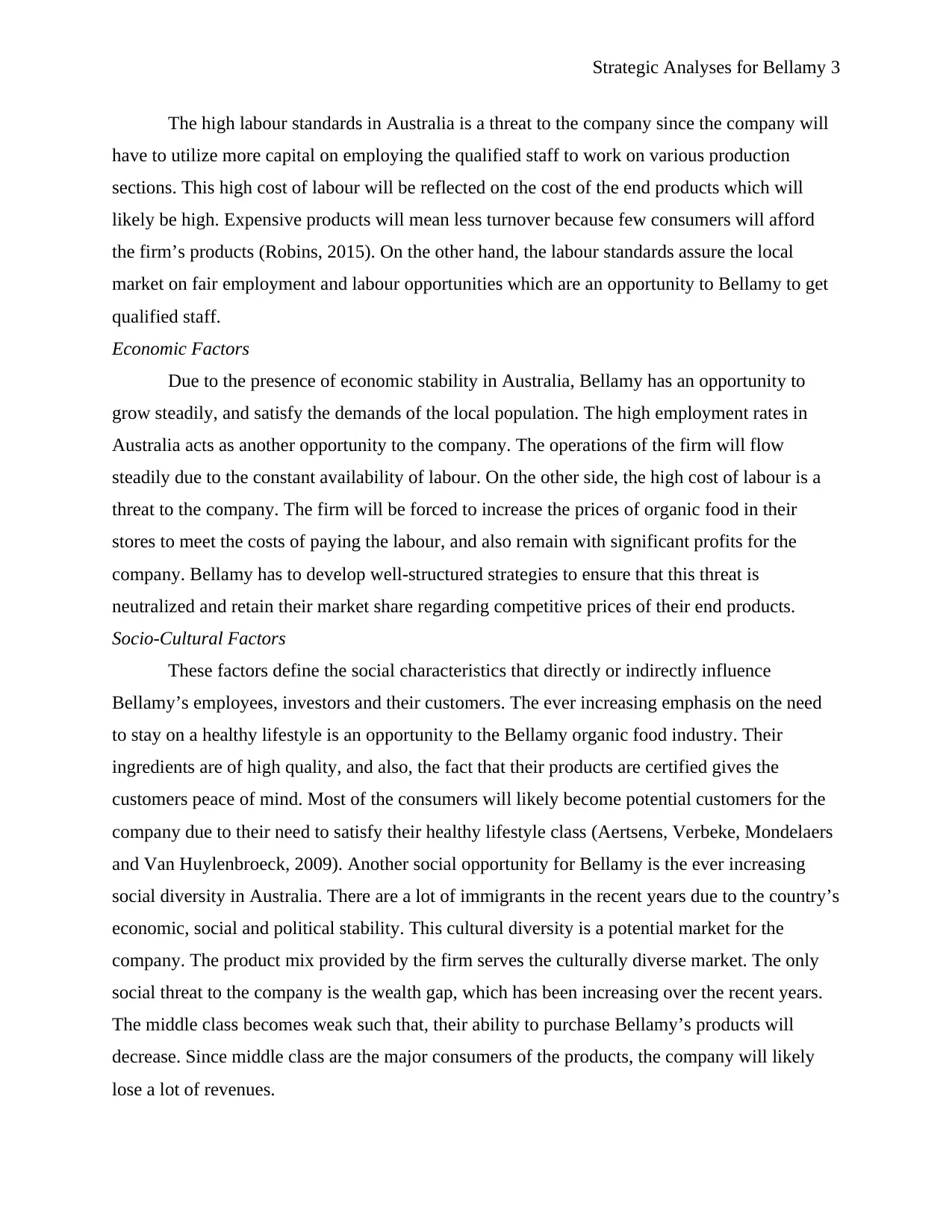
Strategic Analyses for Bellamy 3
The high labour standards in Australia is a threat to the company since the company will
have to utilize more capital on employing the qualified staff to work on various production
sections. This high cost of labour will be reflected on the cost of the end products which will
likely be high. Expensive products will mean less turnover because few consumers will afford
the firm’s products (Robins, 2015). On the other hand, the labour standards assure the local
market on fair employment and labour opportunities which are an opportunity to Bellamy to get
qualified staff.
Economic Factors
Due to the presence of economic stability in Australia, Bellamy has an opportunity to
grow steadily, and satisfy the demands of the local population. The high employment rates in
Australia acts as another opportunity to the company. The operations of the firm will flow
steadily due to the constant availability of labour. On the other side, the high cost of labour is a
threat to the company. The firm will be forced to increase the prices of organic food in their
stores to meet the costs of paying the labour, and also remain with significant profits for the
company. Bellamy has to develop well-structured strategies to ensure that this threat is
neutralized and retain their market share regarding competitive prices of their end products.
Socio-Cultural Factors
These factors define the social characteristics that directly or indirectly influence
Bellamy’s employees, investors and their customers. The ever increasing emphasis on the need
to stay on a healthy lifestyle is an opportunity to the Bellamy organic food industry. Their
ingredients are of high quality, and also, the fact that their products are certified gives the
customers peace of mind. Most of the consumers will likely become potential customers for the
company due to their need to satisfy their healthy lifestyle class (Aertsens, Verbeke, Mondelaers
and Van Huylenbroeck, 2009). Another social opportunity for Bellamy is the ever increasing
social diversity in Australia. There are a lot of immigrants in the recent years due to the country’s
economic, social and political stability. This cultural diversity is a potential market for the
company. The product mix provided by the firm serves the culturally diverse market. The only
social threat to the company is the wealth gap, which has been increasing over the recent years.
The middle class becomes weak such that, their ability to purchase Bellamy’s products will
decrease. Since middle class are the major consumers of the products, the company will likely
lose a lot of revenues.
The high labour standards in Australia is a threat to the company since the company will
have to utilize more capital on employing the qualified staff to work on various production
sections. This high cost of labour will be reflected on the cost of the end products which will
likely be high. Expensive products will mean less turnover because few consumers will afford
the firm’s products (Robins, 2015). On the other hand, the labour standards assure the local
market on fair employment and labour opportunities which are an opportunity to Bellamy to get
qualified staff.
Economic Factors
Due to the presence of economic stability in Australia, Bellamy has an opportunity to
grow steadily, and satisfy the demands of the local population. The high employment rates in
Australia acts as another opportunity to the company. The operations of the firm will flow
steadily due to the constant availability of labour. On the other side, the high cost of labour is a
threat to the company. The firm will be forced to increase the prices of organic food in their
stores to meet the costs of paying the labour, and also remain with significant profits for the
company. Bellamy has to develop well-structured strategies to ensure that this threat is
neutralized and retain their market share regarding competitive prices of their end products.
Socio-Cultural Factors
These factors define the social characteristics that directly or indirectly influence
Bellamy’s employees, investors and their customers. The ever increasing emphasis on the need
to stay on a healthy lifestyle is an opportunity to the Bellamy organic food industry. Their
ingredients are of high quality, and also, the fact that their products are certified gives the
customers peace of mind. Most of the consumers will likely become potential customers for the
company due to their need to satisfy their healthy lifestyle class (Aertsens, Verbeke, Mondelaers
and Van Huylenbroeck, 2009). Another social opportunity for Bellamy is the ever increasing
social diversity in Australia. There are a lot of immigrants in the recent years due to the country’s
economic, social and political stability. This cultural diversity is a potential market for the
company. The product mix provided by the firm serves the culturally diverse market. The only
social threat to the company is the wealth gap, which has been increasing over the recent years.
The middle class becomes weak such that, their ability to purchase Bellamy’s products will
decrease. Since middle class are the major consumers of the products, the company will likely
lose a lot of revenues.
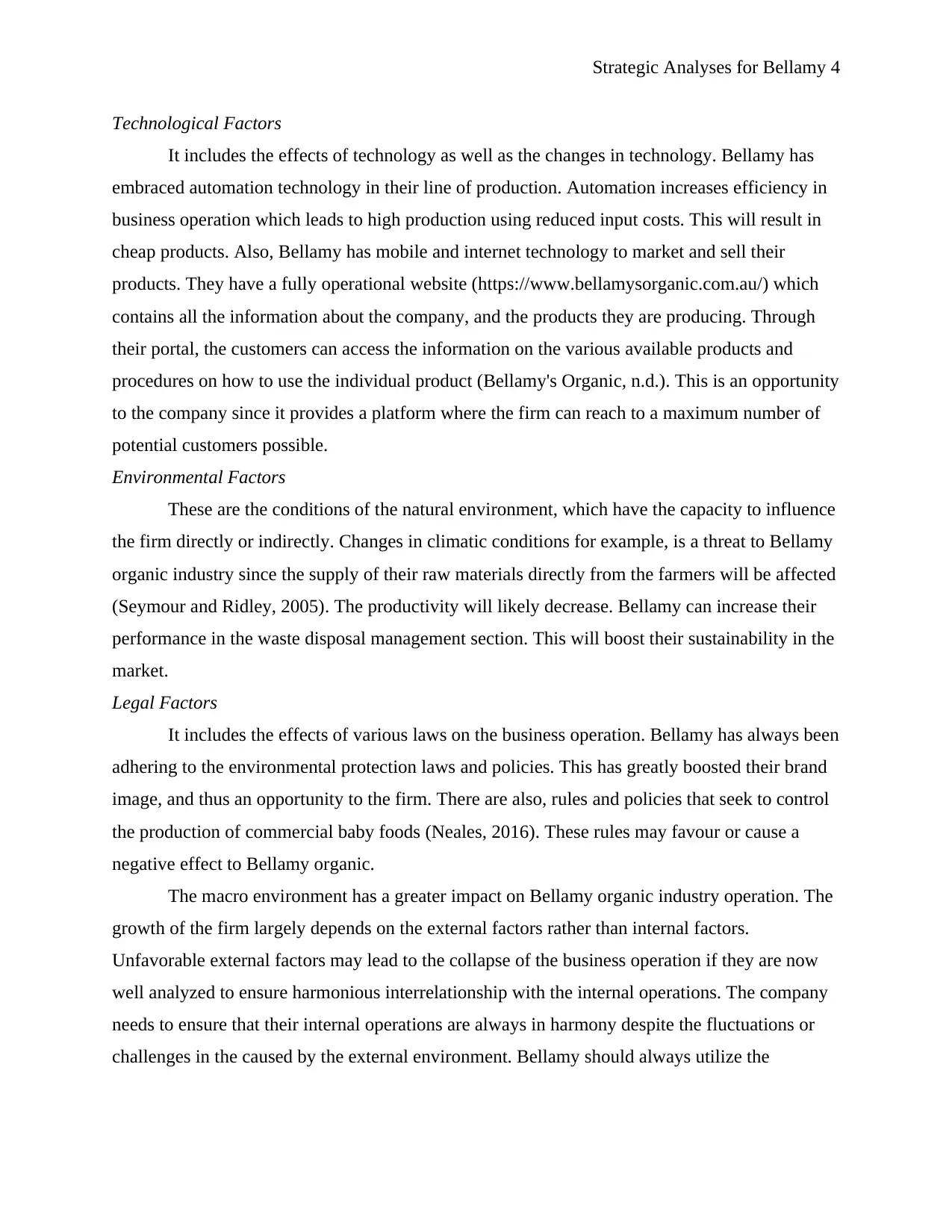
Strategic Analyses for Bellamy 4
Technological Factors
It includes the effects of technology as well as the changes in technology. Bellamy has
embraced automation technology in their line of production. Automation increases efficiency in
business operation which leads to high production using reduced input costs. This will result in
cheap products. Also, Bellamy has mobile and internet technology to market and sell their
products. They have a fully operational website (https://www.bellamysorganic.com.au/) which
contains all the information about the company, and the products they are producing. Through
their portal, the customers can access the information on the various available products and
procedures on how to use the individual product (Bellamy's Organic, n.d.). This is an opportunity
to the company since it provides a platform where the firm can reach to a maximum number of
potential customers possible.
Environmental Factors
These are the conditions of the natural environment, which have the capacity to influence
the firm directly or indirectly. Changes in climatic conditions for example, is a threat to Bellamy
organic industry since the supply of their raw materials directly from the farmers will be affected
(Seymour and Ridley, 2005). The productivity will likely decrease. Bellamy can increase their
performance in the waste disposal management section. This will boost their sustainability in the
market.
Legal Factors
It includes the effects of various laws on the business operation. Bellamy has always been
adhering to the environmental protection laws and policies. This has greatly boosted their brand
image, and thus an opportunity to the firm. There are also, rules and policies that seek to control
the production of commercial baby foods (Neales, 2016). These rules may favour or cause a
negative effect to Bellamy organic.
The macro environment has a greater impact on Bellamy organic industry operation. The
growth of the firm largely depends on the external factors rather than internal factors.
Unfavorable external factors may lead to the collapse of the business operation if they are now
well analyzed to ensure harmonious interrelationship with the internal operations. The company
needs to ensure that their internal operations are always in harmony despite the fluctuations or
challenges in the caused by the external environment. Bellamy should always utilize the
Technological Factors
It includes the effects of technology as well as the changes in technology. Bellamy has
embraced automation technology in their line of production. Automation increases efficiency in
business operation which leads to high production using reduced input costs. This will result in
cheap products. Also, Bellamy has mobile and internet technology to market and sell their
products. They have a fully operational website (https://www.bellamysorganic.com.au/) which
contains all the information about the company, and the products they are producing. Through
their portal, the customers can access the information on the various available products and
procedures on how to use the individual product (Bellamy's Organic, n.d.). This is an opportunity
to the company since it provides a platform where the firm can reach to a maximum number of
potential customers possible.
Environmental Factors
These are the conditions of the natural environment, which have the capacity to influence
the firm directly or indirectly. Changes in climatic conditions for example, is a threat to Bellamy
organic industry since the supply of their raw materials directly from the farmers will be affected
(Seymour and Ridley, 2005). The productivity will likely decrease. Bellamy can increase their
performance in the waste disposal management section. This will boost their sustainability in the
market.
Legal Factors
It includes the effects of various laws on the business operation. Bellamy has always been
adhering to the environmental protection laws and policies. This has greatly boosted their brand
image, and thus an opportunity to the firm. There are also, rules and policies that seek to control
the production of commercial baby foods (Neales, 2016). These rules may favour or cause a
negative effect to Bellamy organic.
The macro environment has a greater impact on Bellamy organic industry operation. The
growth of the firm largely depends on the external factors rather than internal factors.
Unfavorable external factors may lead to the collapse of the business operation if they are now
well analyzed to ensure harmonious interrelationship with the internal operations. The company
needs to ensure that their internal operations are always in harmony despite the fluctuations or
challenges in the caused by the external environment. Bellamy should always utilize the
Secure Best Marks with AI Grader
Need help grading? Try our AI Grader for instant feedback on your assignments.
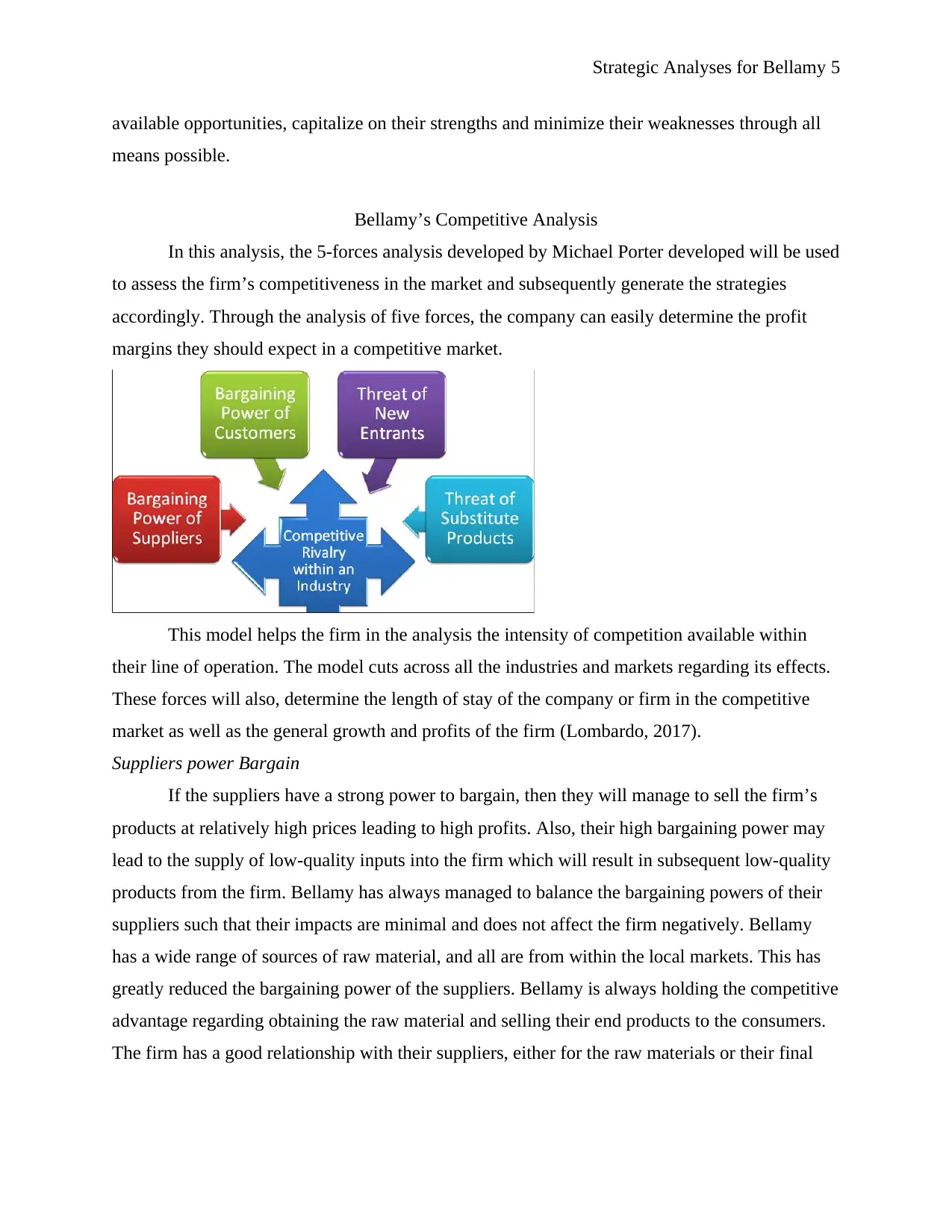
Strategic Analyses for Bellamy 5
available opportunities, capitalize on their strengths and minimize their weaknesses through all
means possible.
Bellamy’s Competitive Analysis
In this analysis, the 5-forces analysis developed by Michael Porter developed will be used
to assess the firm’s competitiveness in the market and subsequently generate the strategies
accordingly. Through the analysis of five forces, the company can easily determine the profit
margins they should expect in a competitive market.
This model helps the firm in the analysis the intensity of competition available within
their line of operation. The model cuts across all the industries and markets regarding its effects.
These forces will also, determine the length of stay of the company or firm in the competitive
market as well as the general growth and profits of the firm (Lombardo, 2017).
Suppliers power Bargain
If the suppliers have a strong power to bargain, then they will manage to sell the firm’s
products at relatively high prices leading to high profits. Also, their high bargaining power may
lead to the supply of low-quality inputs into the firm which will result in subsequent low-quality
products from the firm. Bellamy has always managed to balance the bargaining powers of their
suppliers such that their impacts are minimal and does not affect the firm negatively. Bellamy
has a wide range of sources of raw material, and all are from within the local markets. This has
greatly reduced the bargaining power of the suppliers. Bellamy is always holding the competitive
advantage regarding obtaining the raw material and selling their end products to the consumers.
The firm has a good relationship with their suppliers, either for the raw materials or their final
available opportunities, capitalize on their strengths and minimize their weaknesses through all
means possible.
Bellamy’s Competitive Analysis
In this analysis, the 5-forces analysis developed by Michael Porter developed will be used
to assess the firm’s competitiveness in the market and subsequently generate the strategies
accordingly. Through the analysis of five forces, the company can easily determine the profit
margins they should expect in a competitive market.
This model helps the firm in the analysis the intensity of competition available within
their line of operation. The model cuts across all the industries and markets regarding its effects.
These forces will also, determine the length of stay of the company or firm in the competitive
market as well as the general growth and profits of the firm (Lombardo, 2017).
Suppliers power Bargain
If the suppliers have a strong power to bargain, then they will manage to sell the firm’s
products at relatively high prices leading to high profits. Also, their high bargaining power may
lead to the supply of low-quality inputs into the firm which will result in subsequent low-quality
products from the firm. Bellamy has always managed to balance the bargaining powers of their
suppliers such that their impacts are minimal and does not affect the firm negatively. Bellamy
has a wide range of sources of raw material, and all are from within the local markets. This has
greatly reduced the bargaining power of the suppliers. Bellamy is always holding the competitive
advantage regarding obtaining the raw material and selling their end products to the consumers.
The firm has a good relationship with their suppliers, either for the raw materials or their final
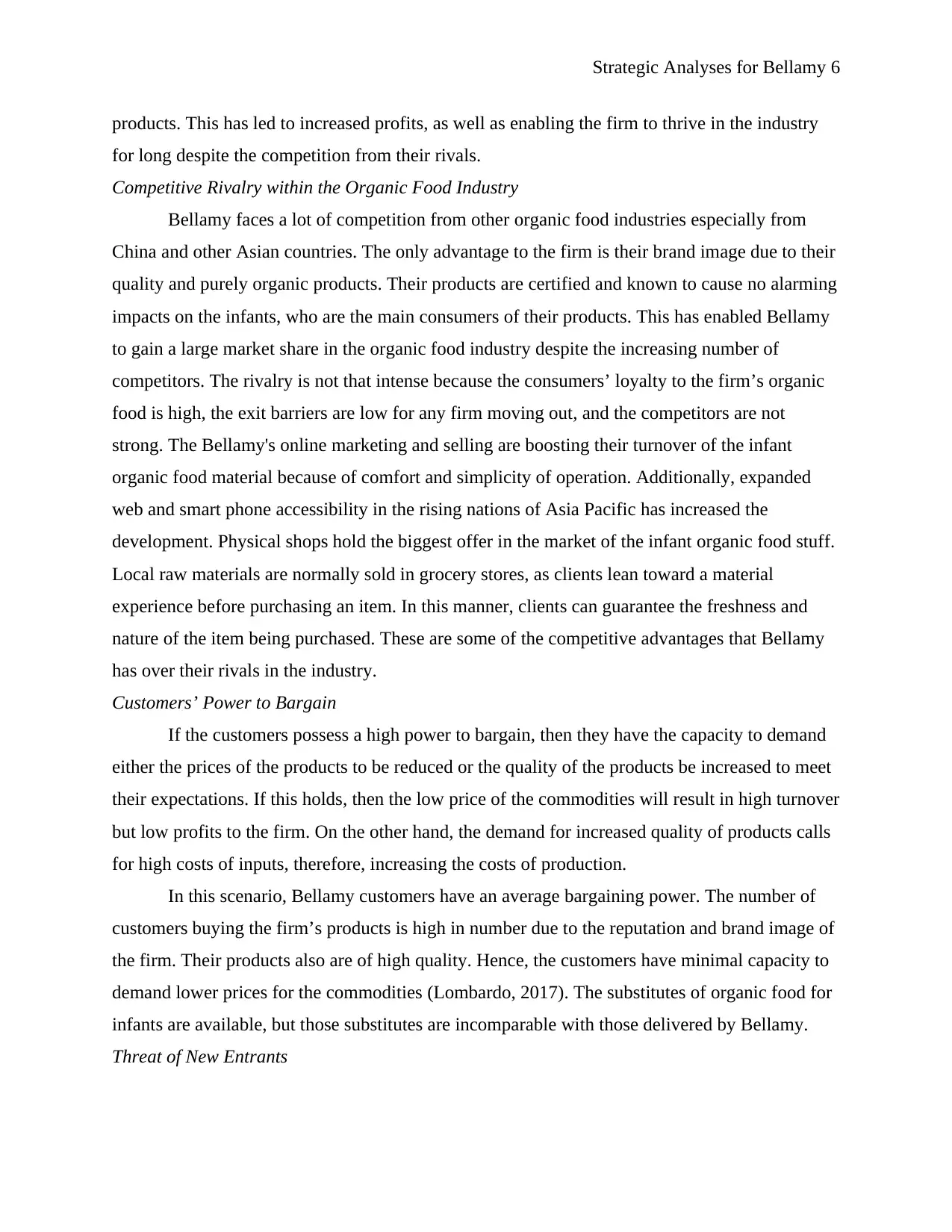
Strategic Analyses for Bellamy 6
products. This has led to increased profits, as well as enabling the firm to thrive in the industry
for long despite the competition from their rivals.
Competitive Rivalry within the Organic Food Industry
Bellamy faces a lot of competition from other organic food industries especially from
China and other Asian countries. The only advantage to the firm is their brand image due to their
quality and purely organic products. Their products are certified and known to cause no alarming
impacts on the infants, who are the main consumers of their products. This has enabled Bellamy
to gain a large market share in the organic food industry despite the increasing number of
competitors. The rivalry is not that intense because the consumers’ loyalty to the firm’s organic
food is high, the exit barriers are low for any firm moving out, and the competitors are not
strong. The Bellamy's online marketing and selling are boosting their turnover of the infant
organic food material because of comfort and simplicity of operation. Additionally, expanded
web and smart phone accessibility in the rising nations of Asia Pacific has increased the
development. Physical shops hold the biggest offer in the market of the infant organic food stuff.
Local raw materials are normally sold in grocery stores, as clients lean toward a material
experience before purchasing an item. In this manner, clients can guarantee the freshness and
nature of the item being purchased. These are some of the competitive advantages that Bellamy
has over their rivals in the industry.
Customers’ Power to Bargain
If the customers possess a high power to bargain, then they have the capacity to demand
either the prices of the products to be reduced or the quality of the products be increased to meet
their expectations. If this holds, then the low price of the commodities will result in high turnover
but low profits to the firm. On the other hand, the demand for increased quality of products calls
for high costs of inputs, therefore, increasing the costs of production.
In this scenario, Bellamy customers have an average bargaining power. The number of
customers buying the firm’s products is high in number due to the reputation and brand image of
the firm. Their products also are of high quality. Hence, the customers have minimal capacity to
demand lower prices for the commodities (Lombardo, 2017). The substitutes of organic food for
infants are available, but those substitutes are incomparable with those delivered by Bellamy.
Threat of New Entrants
products. This has led to increased profits, as well as enabling the firm to thrive in the industry
for long despite the competition from their rivals.
Competitive Rivalry within the Organic Food Industry
Bellamy faces a lot of competition from other organic food industries especially from
China and other Asian countries. The only advantage to the firm is their brand image due to their
quality and purely organic products. Their products are certified and known to cause no alarming
impacts on the infants, who are the main consumers of their products. This has enabled Bellamy
to gain a large market share in the organic food industry despite the increasing number of
competitors. The rivalry is not that intense because the consumers’ loyalty to the firm’s organic
food is high, the exit barriers are low for any firm moving out, and the competitors are not
strong. The Bellamy's online marketing and selling are boosting their turnover of the infant
organic food material because of comfort and simplicity of operation. Additionally, expanded
web and smart phone accessibility in the rising nations of Asia Pacific has increased the
development. Physical shops hold the biggest offer in the market of the infant organic food stuff.
Local raw materials are normally sold in grocery stores, as clients lean toward a material
experience before purchasing an item. In this manner, clients can guarantee the freshness and
nature of the item being purchased. These are some of the competitive advantages that Bellamy
has over their rivals in the industry.
Customers’ Power to Bargain
If the customers possess a high power to bargain, then they have the capacity to demand
either the prices of the products to be reduced or the quality of the products be increased to meet
their expectations. If this holds, then the low price of the commodities will result in high turnover
but low profits to the firm. On the other hand, the demand for increased quality of products calls
for high costs of inputs, therefore, increasing the costs of production.
In this scenario, Bellamy customers have an average bargaining power. The number of
customers buying the firm’s products is high in number due to the reputation and brand image of
the firm. Their products also are of high quality. Hence, the customers have minimal capacity to
demand lower prices for the commodities (Lombardo, 2017). The substitutes of organic food for
infants are available, but those substitutes are incomparable with those delivered by Bellamy.
Threat of New Entrants
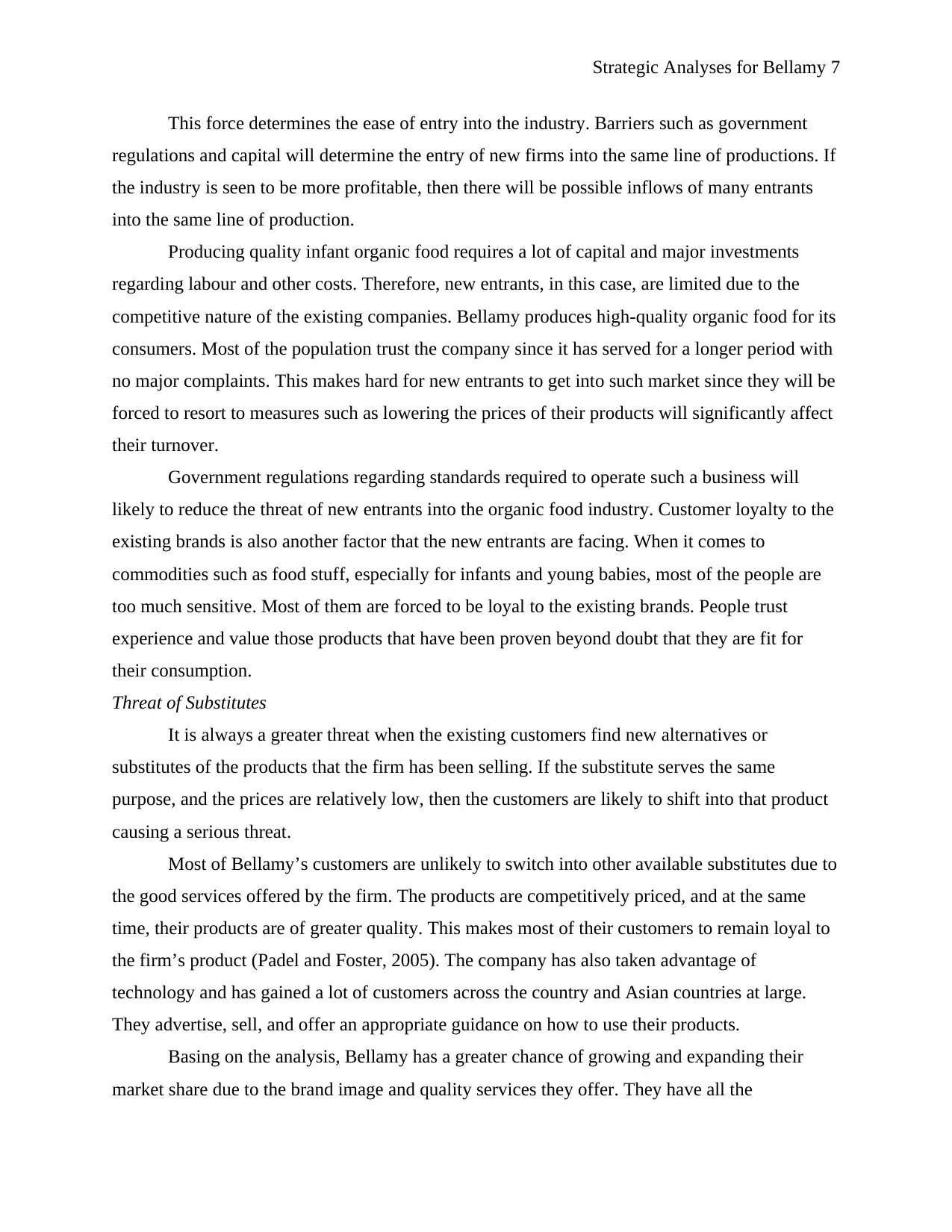
Strategic Analyses for Bellamy 7
This force determines the ease of entry into the industry. Barriers such as government
regulations and capital will determine the entry of new firms into the same line of productions. If
the industry is seen to be more profitable, then there will be possible inflows of many entrants
into the same line of production.
Producing quality infant organic food requires a lot of capital and major investments
regarding labour and other costs. Therefore, new entrants, in this case, are limited due to the
competitive nature of the existing companies. Bellamy produces high-quality organic food for its
consumers. Most of the population trust the company since it has served for a longer period with
no major complaints. This makes hard for new entrants to get into such market since they will be
forced to resort to measures such as lowering the prices of their products will significantly affect
their turnover.
Government regulations regarding standards required to operate such a business will
likely to reduce the threat of new entrants into the organic food industry. Customer loyalty to the
existing brands is also another factor that the new entrants are facing. When it comes to
commodities such as food stuff, especially for infants and young babies, most of the people are
too much sensitive. Most of them are forced to be loyal to the existing brands. People trust
experience and value those products that have been proven beyond doubt that they are fit for
their consumption.
Threat of Substitutes
It is always a greater threat when the existing customers find new alternatives or
substitutes of the products that the firm has been selling. If the substitute serves the same
purpose, and the prices are relatively low, then the customers are likely to shift into that product
causing a serious threat.
Most of Bellamy’s customers are unlikely to switch into other available substitutes due to
the good services offered by the firm. The products are competitively priced, and at the same
time, their products are of greater quality. This makes most of their customers to remain loyal to
the firm’s product (Padel and Foster, 2005). The company has also taken advantage of
technology and has gained a lot of customers across the country and Asian countries at large.
They advertise, sell, and offer an appropriate guidance on how to use their products.
Basing on the analysis, Bellamy has a greater chance of growing and expanding their
market share due to the brand image and quality services they offer. They have all the
This force determines the ease of entry into the industry. Barriers such as government
regulations and capital will determine the entry of new firms into the same line of productions. If
the industry is seen to be more profitable, then there will be possible inflows of many entrants
into the same line of production.
Producing quality infant organic food requires a lot of capital and major investments
regarding labour and other costs. Therefore, new entrants, in this case, are limited due to the
competitive nature of the existing companies. Bellamy produces high-quality organic food for its
consumers. Most of the population trust the company since it has served for a longer period with
no major complaints. This makes hard for new entrants to get into such market since they will be
forced to resort to measures such as lowering the prices of their products will significantly affect
their turnover.
Government regulations regarding standards required to operate such a business will
likely to reduce the threat of new entrants into the organic food industry. Customer loyalty to the
existing brands is also another factor that the new entrants are facing. When it comes to
commodities such as food stuff, especially for infants and young babies, most of the people are
too much sensitive. Most of them are forced to be loyal to the existing brands. People trust
experience and value those products that have been proven beyond doubt that they are fit for
their consumption.
Threat of Substitutes
It is always a greater threat when the existing customers find new alternatives or
substitutes of the products that the firm has been selling. If the substitute serves the same
purpose, and the prices are relatively low, then the customers are likely to shift into that product
causing a serious threat.
Most of Bellamy’s customers are unlikely to switch into other available substitutes due to
the good services offered by the firm. The products are competitively priced, and at the same
time, their products are of greater quality. This makes most of their customers to remain loyal to
the firm’s product (Padel and Foster, 2005). The company has also taken advantage of
technology and has gained a lot of customers across the country and Asian countries at large.
They advertise, sell, and offer an appropriate guidance on how to use their products.
Basing on the analysis, Bellamy has a greater chance of growing and expanding their
market share due to the brand image and quality services they offer. They have all the
Paraphrase This Document
Need a fresh take? Get an instant paraphrase of this document with our AI Paraphraser
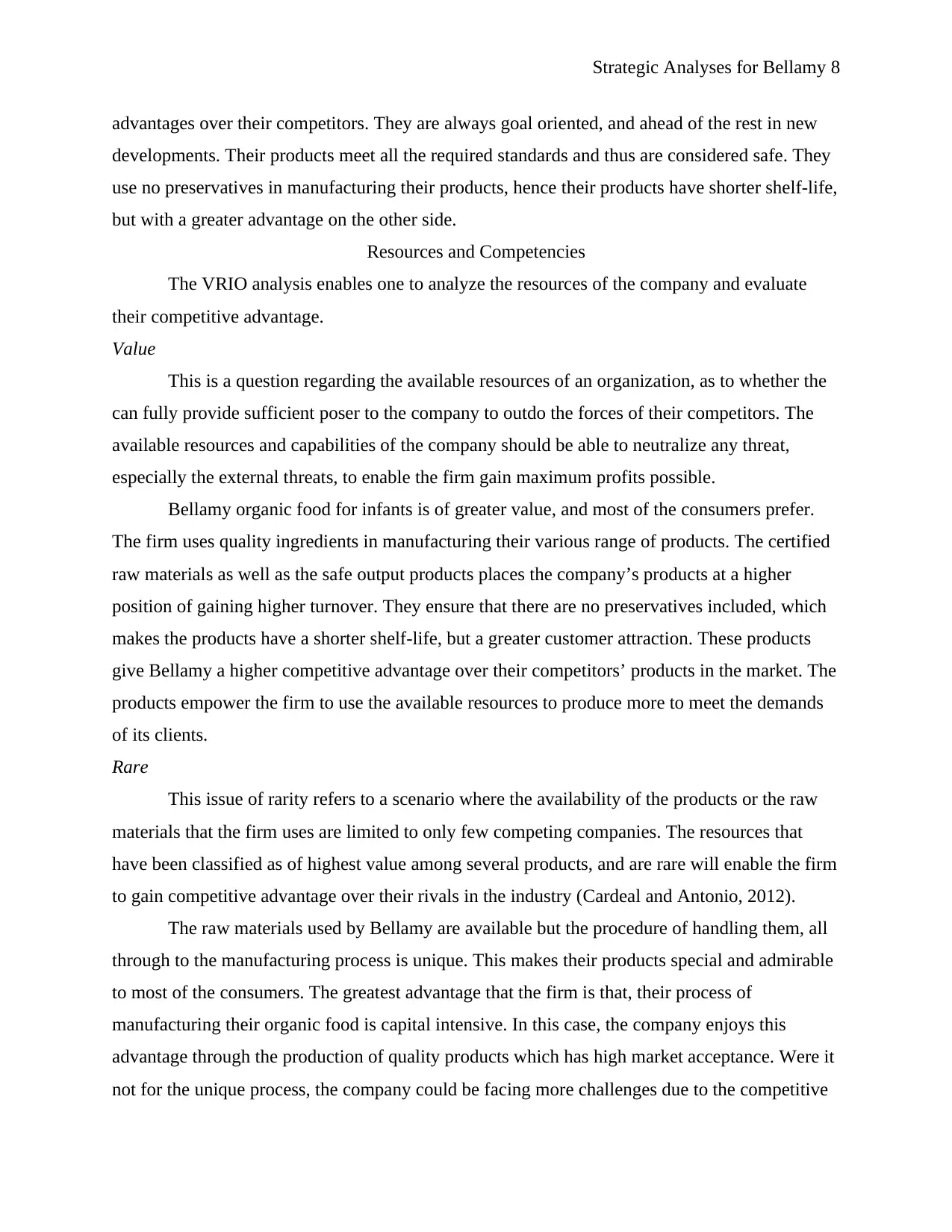
Strategic Analyses for Bellamy 8
advantages over their competitors. They are always goal oriented, and ahead of the rest in new
developments. Their products meet all the required standards and thus are considered safe. They
use no preservatives in manufacturing their products, hence their products have shorter shelf-life,
but with a greater advantage on the other side.
Resources and Competencies
The VRIO analysis enables one to analyze the resources of the company and evaluate
their competitive advantage.
Value
This is a question regarding the available resources of an organization, as to whether the
can fully provide sufficient poser to the company to outdo the forces of their competitors. The
available resources and capabilities of the company should be able to neutralize any threat,
especially the external threats, to enable the firm gain maximum profits possible.
Bellamy organic food for infants is of greater value, and most of the consumers prefer.
The firm uses quality ingredients in manufacturing their various range of products. The certified
raw materials as well as the safe output products places the company’s products at a higher
position of gaining higher turnover. They ensure that there are no preservatives included, which
makes the products have a shorter shelf-life, but a greater customer attraction. These products
give Bellamy a higher competitive advantage over their competitors’ products in the market. The
products empower the firm to use the available resources to produce more to meet the demands
of its clients.
Rare
This issue of rarity refers to a scenario where the availability of the products or the raw
materials that the firm uses are limited to only few competing companies. The resources that
have been classified as of highest value among several products, and are rare will enable the firm
to gain competitive advantage over their rivals in the industry (Cardeal and Antonio, 2012).
The raw materials used by Bellamy are available but the procedure of handling them, all
through to the manufacturing process is unique. This makes their products special and admirable
to most of the consumers. The greatest advantage that the firm is that, their process of
manufacturing their organic food is capital intensive. In this case, the company enjoys this
advantage through the production of quality products which has high market acceptance. Were it
not for the unique process, the company could be facing more challenges due to the competitive
advantages over their competitors. They are always goal oriented, and ahead of the rest in new
developments. Their products meet all the required standards and thus are considered safe. They
use no preservatives in manufacturing their products, hence their products have shorter shelf-life,
but with a greater advantage on the other side.
Resources and Competencies
The VRIO analysis enables one to analyze the resources of the company and evaluate
their competitive advantage.
Value
This is a question regarding the available resources of an organization, as to whether the
can fully provide sufficient poser to the company to outdo the forces of their competitors. The
available resources and capabilities of the company should be able to neutralize any threat,
especially the external threats, to enable the firm gain maximum profits possible.
Bellamy organic food for infants is of greater value, and most of the consumers prefer.
The firm uses quality ingredients in manufacturing their various range of products. The certified
raw materials as well as the safe output products places the company’s products at a higher
position of gaining higher turnover. They ensure that there are no preservatives included, which
makes the products have a shorter shelf-life, but a greater customer attraction. These products
give Bellamy a higher competitive advantage over their competitors’ products in the market. The
products empower the firm to use the available resources to produce more to meet the demands
of its clients.
Rare
This issue of rarity refers to a scenario where the availability of the products or the raw
materials that the firm uses are limited to only few competing companies. The resources that
have been classified as of highest value among several products, and are rare will enable the firm
to gain competitive advantage over their rivals in the industry (Cardeal and Antonio, 2012).
The raw materials used by Bellamy are available but the procedure of handling them, all
through to the manufacturing process is unique. This makes their products special and admirable
to most of the consumers. The greatest advantage that the firm is that, their process of
manufacturing their organic food is capital intensive. In this case, the company enjoys this
advantage through the production of quality products which has high market acceptance. Were it
not for the unique process, the company could be facing more challenges due to the competitive
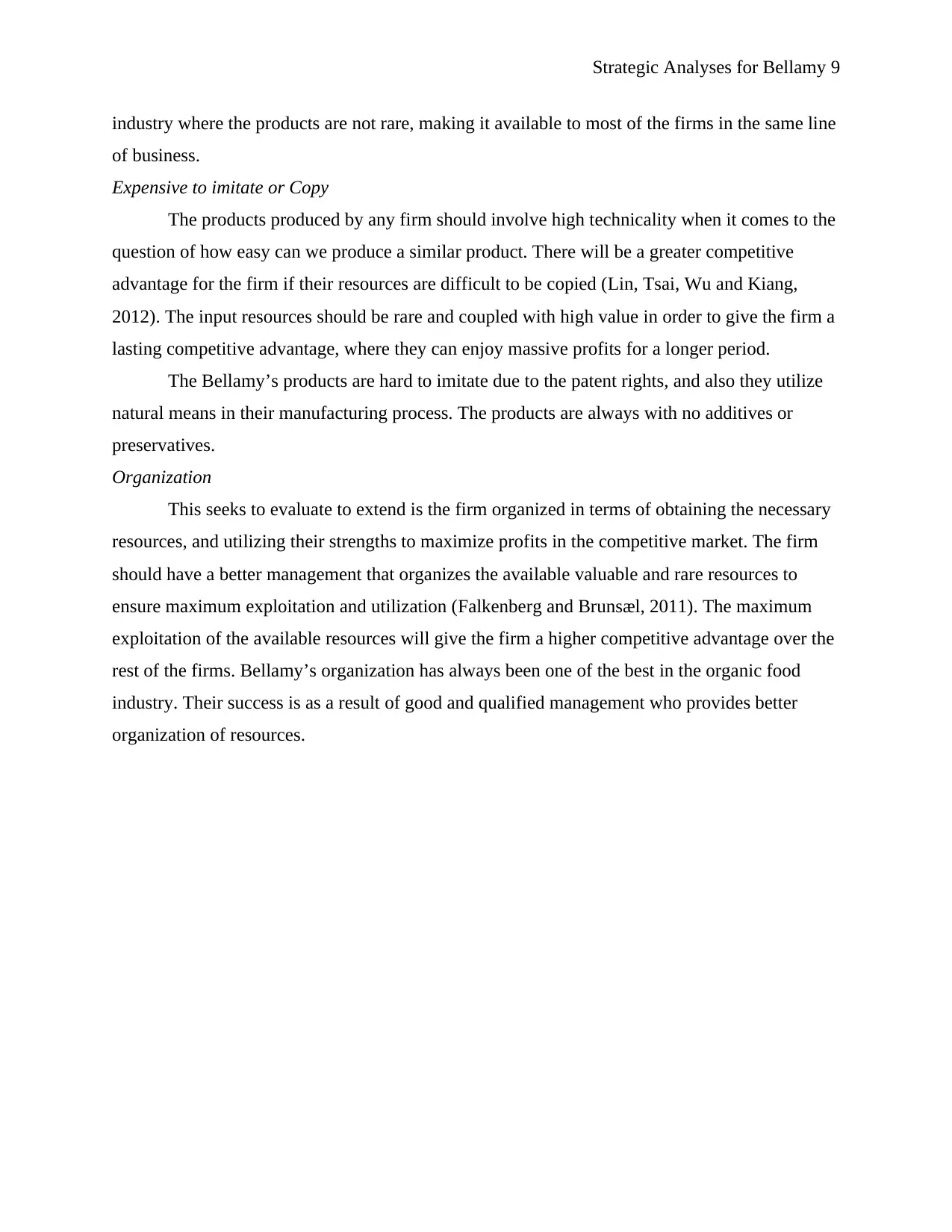
Strategic Analyses for Bellamy 9
industry where the products are not rare, making it available to most of the firms in the same line
of business.
Expensive to imitate or Copy
The products produced by any firm should involve high technicality when it comes to the
question of how easy can we produce a similar product. There will be a greater competitive
advantage for the firm if their resources are difficult to be copied (Lin, Tsai, Wu and Kiang,
2012). The input resources should be rare and coupled with high value in order to give the firm a
lasting competitive advantage, where they can enjoy massive profits for a longer period.
The Bellamy’s products are hard to imitate due to the patent rights, and also they utilize
natural means in their manufacturing process. The products are always with no additives or
preservatives.
Organization
This seeks to evaluate to extend is the firm organized in terms of obtaining the necessary
resources, and utilizing their strengths to maximize profits in the competitive market. The firm
should have a better management that organizes the available valuable and rare resources to
ensure maximum exploitation and utilization (Falkenberg and Brunsæl, 2011). The maximum
exploitation of the available resources will give the firm a higher competitive advantage over the
rest of the firms. Bellamy’s organization has always been one of the best in the organic food
industry. Their success is as a result of good and qualified management who provides better
organization of resources.
industry where the products are not rare, making it available to most of the firms in the same line
of business.
Expensive to imitate or Copy
The products produced by any firm should involve high technicality when it comes to the
question of how easy can we produce a similar product. There will be a greater competitive
advantage for the firm if their resources are difficult to be copied (Lin, Tsai, Wu and Kiang,
2012). The input resources should be rare and coupled with high value in order to give the firm a
lasting competitive advantage, where they can enjoy massive profits for a longer period.
The Bellamy’s products are hard to imitate due to the patent rights, and also they utilize
natural means in their manufacturing process. The products are always with no additives or
preservatives.
Organization
This seeks to evaluate to extend is the firm organized in terms of obtaining the necessary
resources, and utilizing their strengths to maximize profits in the competitive market. The firm
should have a better management that organizes the available valuable and rare resources to
ensure maximum exploitation and utilization (Falkenberg and Brunsæl, 2011). The maximum
exploitation of the available resources will give the firm a higher competitive advantage over the
rest of the firms. Bellamy’s organization has always been one of the best in the organic food
industry. Their success is as a result of good and qualified management who provides better
organization of resources.
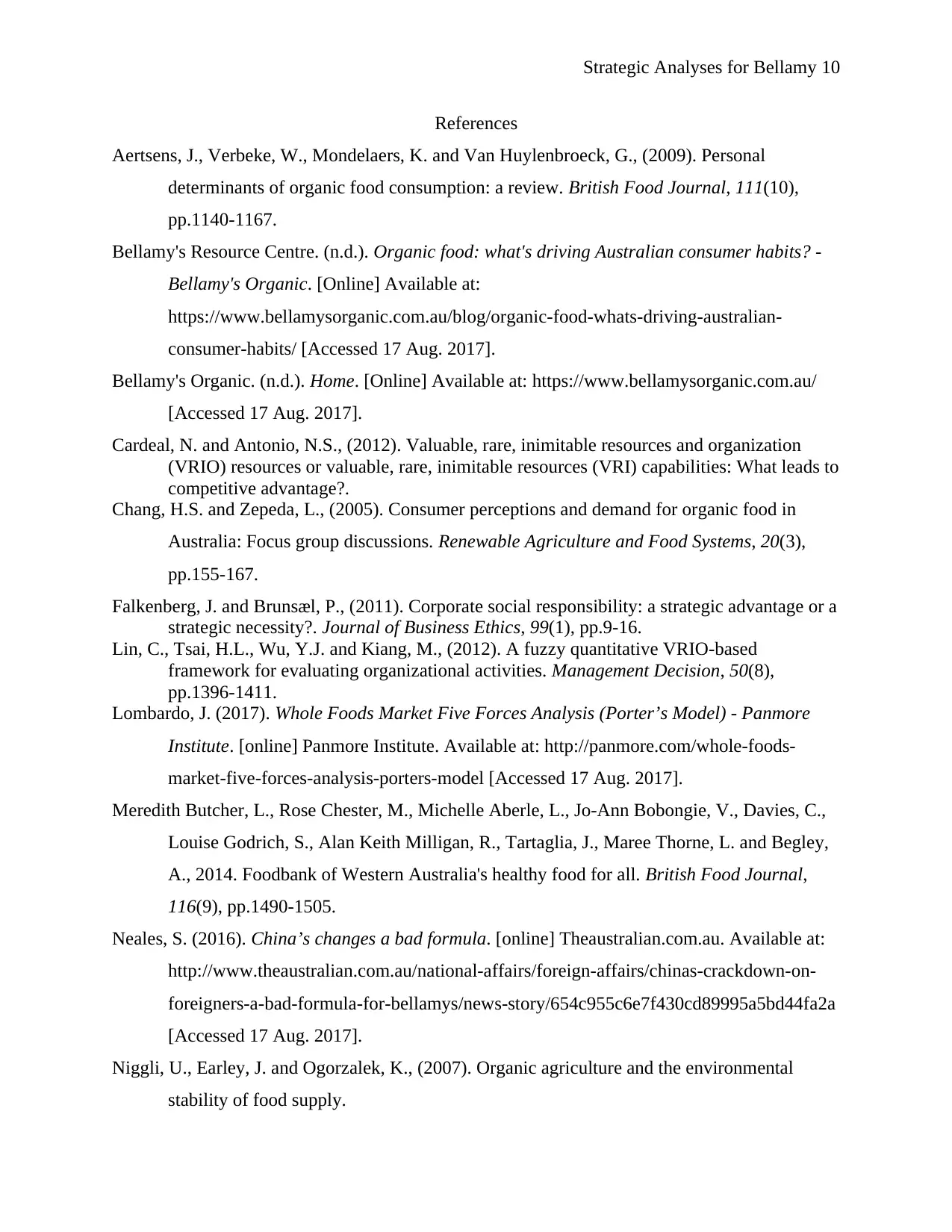
Strategic Analyses for Bellamy 10
References
Aertsens, J., Verbeke, W., Mondelaers, K. and Van Huylenbroeck, G., (2009). Personal
determinants of organic food consumption: a review. British Food Journal, 111(10),
pp.1140-1167.
Bellamy's Resource Centre. (n.d.). Organic food: what's driving Australian consumer habits? -
Bellamy's Organic. [Online] Available at:
https://www.bellamysorganic.com.au/blog/organic-food-whats-driving-australian-
consumer-habits/ [Accessed 17 Aug. 2017].
Bellamy's Organic. (n.d.). Home. [Online] Available at: https://www.bellamysorganic.com.au/
[Accessed 17 Aug. 2017].
Cardeal, N. and Antonio, N.S., (2012). Valuable, rare, inimitable resources and organization
(VRIO) resources or valuable, rare, inimitable resources (VRI) capabilities: What leads to
competitive advantage?.
Chang, H.S. and Zepeda, L., (2005). Consumer perceptions and demand for organic food in
Australia: Focus group discussions. Renewable Agriculture and Food Systems, 20(3),
pp.155-167.
Falkenberg, J. and Brunsæl, P., (2011). Corporate social responsibility: a strategic advantage or a
strategic necessity?. Journal of Business Ethics, 99(1), pp.9-16.
Lin, C., Tsai, H.L., Wu, Y.J. and Kiang, M., (2012). A fuzzy quantitative VRIO-based
framework for evaluating organizational activities. Management Decision, 50(8),
pp.1396-1411.
Lombardo, J. (2017). Whole Foods Market Five Forces Analysis (Porter’s Model) - Panmore
Institute. [online] Panmore Institute. Available at: http://panmore.com/whole-foods-
market-five-forces-analysis-porters-model [Accessed 17 Aug. 2017].
Meredith Butcher, L., Rose Chester, M., Michelle Aberle, L., Jo-Ann Bobongie, V., Davies, C.,
Louise Godrich, S., Alan Keith Milligan, R., Tartaglia, J., Maree Thorne, L. and Begley,
A., 2014. Foodbank of Western Australia's healthy food for all. British Food Journal,
116(9), pp.1490-1505.
Neales, S. (2016). China’s changes a bad formula. [online] Theaustralian.com.au. Available at:
http://www.theaustralian.com.au/national-affairs/foreign-affairs/chinas-crackdown-on-
foreigners-a-bad-formula-for-bellamys/news-story/654c955c6e7f430cd89995a5bd44fa2a
[Accessed 17 Aug. 2017].
Niggli, U., Earley, J. and Ogorzalek, K., (2007). Organic agriculture and the environmental
stability of food supply.
References
Aertsens, J., Verbeke, W., Mondelaers, K. and Van Huylenbroeck, G., (2009). Personal
determinants of organic food consumption: a review. British Food Journal, 111(10),
pp.1140-1167.
Bellamy's Resource Centre. (n.d.). Organic food: what's driving Australian consumer habits? -
Bellamy's Organic. [Online] Available at:
https://www.bellamysorganic.com.au/blog/organic-food-whats-driving-australian-
consumer-habits/ [Accessed 17 Aug. 2017].
Bellamy's Organic. (n.d.). Home. [Online] Available at: https://www.bellamysorganic.com.au/
[Accessed 17 Aug. 2017].
Cardeal, N. and Antonio, N.S., (2012). Valuable, rare, inimitable resources and organization
(VRIO) resources or valuable, rare, inimitable resources (VRI) capabilities: What leads to
competitive advantage?.
Chang, H.S. and Zepeda, L., (2005). Consumer perceptions and demand for organic food in
Australia: Focus group discussions. Renewable Agriculture and Food Systems, 20(3),
pp.155-167.
Falkenberg, J. and Brunsæl, P., (2011). Corporate social responsibility: a strategic advantage or a
strategic necessity?. Journal of Business Ethics, 99(1), pp.9-16.
Lin, C., Tsai, H.L., Wu, Y.J. and Kiang, M., (2012). A fuzzy quantitative VRIO-based
framework for evaluating organizational activities. Management Decision, 50(8),
pp.1396-1411.
Lombardo, J. (2017). Whole Foods Market Five Forces Analysis (Porter’s Model) - Panmore
Institute. [online] Panmore Institute. Available at: http://panmore.com/whole-foods-
market-five-forces-analysis-porters-model [Accessed 17 Aug. 2017].
Meredith Butcher, L., Rose Chester, M., Michelle Aberle, L., Jo-Ann Bobongie, V., Davies, C.,
Louise Godrich, S., Alan Keith Milligan, R., Tartaglia, J., Maree Thorne, L. and Begley,
A., 2014. Foodbank of Western Australia's healthy food for all. British Food Journal,
116(9), pp.1490-1505.
Neales, S. (2016). China’s changes a bad formula. [online] Theaustralian.com.au. Available at:
http://www.theaustralian.com.au/national-affairs/foreign-affairs/chinas-crackdown-on-
foreigners-a-bad-formula-for-bellamys/news-story/654c955c6e7f430cd89995a5bd44fa2a
[Accessed 17 Aug. 2017].
Niggli, U., Earley, J. and Ogorzalek, K., (2007). Organic agriculture and the environmental
stability of food supply.
Secure Best Marks with AI Grader
Need help grading? Try our AI Grader for instant feedback on your assignments.
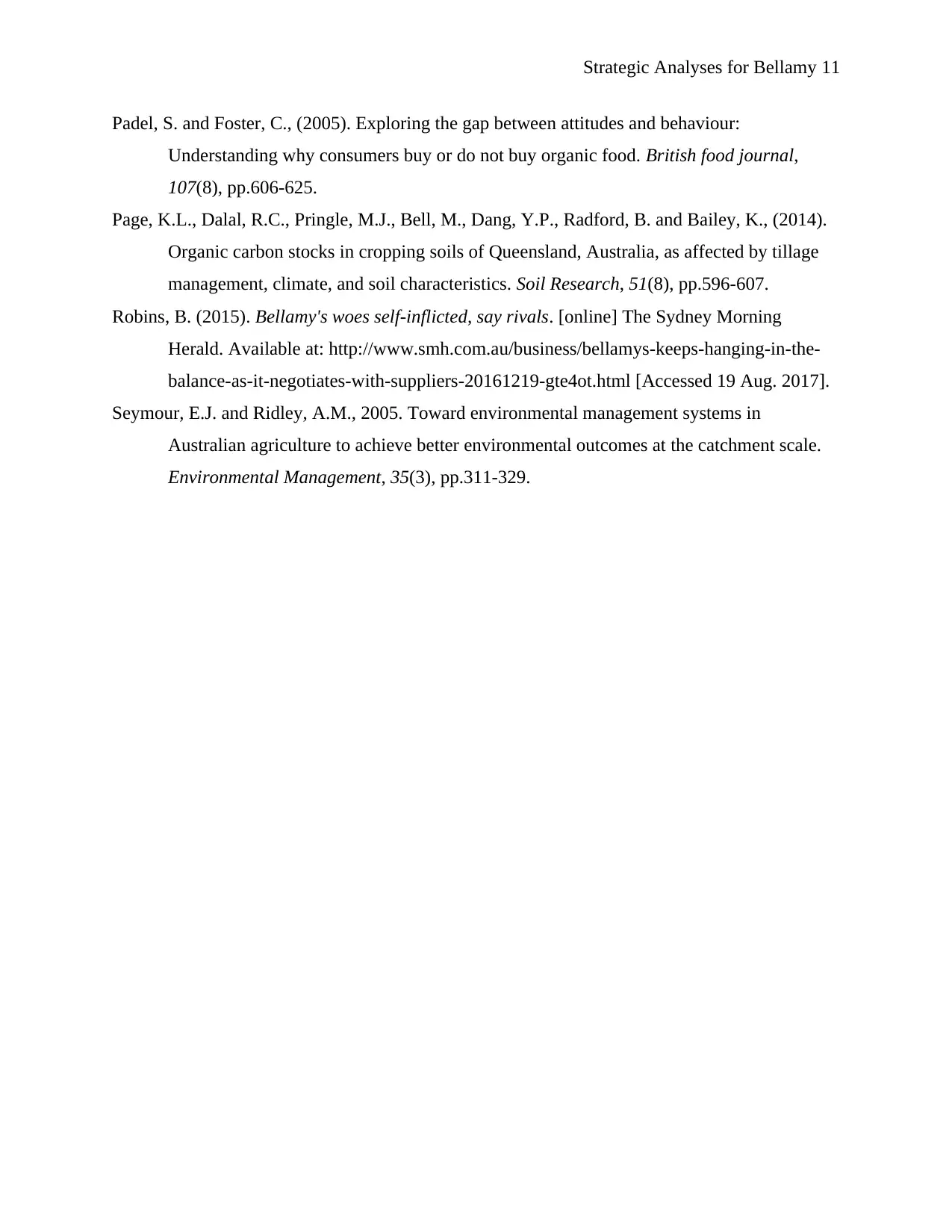
Strategic Analyses for Bellamy 11
Padel, S. and Foster, C., (2005). Exploring the gap between attitudes and behaviour:
Understanding why consumers buy or do not buy organic food. British food journal,
107(8), pp.606-625.
Page, K.L., Dalal, R.C., Pringle, M.J., Bell, M., Dang, Y.P., Radford, B. and Bailey, K., (2014).
Organic carbon stocks in cropping soils of Queensland, Australia, as affected by tillage
management, climate, and soil characteristics. Soil Research, 51(8), pp.596-607.
Robins, B. (2015). Bellamy's woes self-inflicted, say rivals. [online] The Sydney Morning
Herald. Available at: http://www.smh.com.au/business/bellamys-keeps-hanging-in-the-
balance-as-it-negotiates-with-suppliers-20161219-gte4ot.html [Accessed 19 Aug. 2017].
Seymour, E.J. and Ridley, A.M., 2005. Toward environmental management systems in
Australian agriculture to achieve better environmental outcomes at the catchment scale.
Environmental Management, 35(3), pp.311-329.
Padel, S. and Foster, C., (2005). Exploring the gap between attitudes and behaviour:
Understanding why consumers buy or do not buy organic food. British food journal,
107(8), pp.606-625.
Page, K.L., Dalal, R.C., Pringle, M.J., Bell, M., Dang, Y.P., Radford, B. and Bailey, K., (2014).
Organic carbon stocks in cropping soils of Queensland, Australia, as affected by tillage
management, climate, and soil characteristics. Soil Research, 51(8), pp.596-607.
Robins, B. (2015). Bellamy's woes self-inflicted, say rivals. [online] The Sydney Morning
Herald. Available at: http://www.smh.com.au/business/bellamys-keeps-hanging-in-the-
balance-as-it-negotiates-with-suppliers-20161219-gte4ot.html [Accessed 19 Aug. 2017].
Seymour, E.J. and Ridley, A.M., 2005. Toward environmental management systems in
Australian agriculture to achieve better environmental outcomes at the catchment scale.
Environmental Management, 35(3), pp.311-329.
1 out of 11
Related Documents
Your All-in-One AI-Powered Toolkit for Academic Success.
+13062052269
info@desklib.com
Available 24*7 on WhatsApp / Email
![[object Object]](/_next/static/media/star-bottom.7253800d.svg)
Unlock your academic potential
© 2024 | Zucol Services PVT LTD | All rights reserved.





